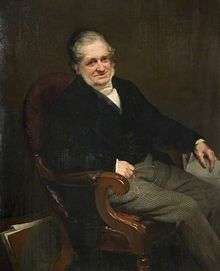William Thomas Roden
| William Thomas Roden RBSA | |
|---|---|
| Born | 1817 |
| Died | 25 December 1892 (age 74 or 75) |
| Occupation | Artist |
| Years active | 1843–1873 |
William Thomas Roden was a nineteenth-century English artist.
Life
William Thomas Roden was born in Bradford Street, Birmingham, England, and apprenticed to a Mr. Tye, an engraver. On Tye's recommendation, Roden moved to London to become an apprentice to George Thomas Doo. He continued to practise engraving for about ten years. Later he returned to Birmingham, where he found success as a portrait painter.
The Birmingham painters William Roden Jr (professional portrait painter, working c. 1866-82), W. Frederick Roden (portrait and figure painter, working c. 1876 – 1889) and Mary Roden (flower painter, working c. 1881 – 1897), are thought to be three of his children.[1]
He died on Christmas Day 1892, at his sister's house in Handsworth, after a long illness.
Career
William Thomas Roden exhibited in London between 1843 and 1879, including six works at the Royal Academy, two at the British Institute (1806–67), and four at the Royal Society of British Artists.[2]
He was a prominent figure within the Royal Birmingham Society of Artists. He exhibited between 1843 and 1887 and was a member for 25 years, from 1848 to 1873. In total, Roden exhibited 86 works at the RBSA Gallery, including 65 portraits (presumably all commissions, since none for sale); a few landscapes; paintings of biblical, literary, or classical subject matter; and some engravings.[2] Notable sitters for Roden include Lord Palmerston, Lord Gladstone, Cardinal Newman, Joseph Chamberlain and fellow artist, Peter Hollins.[3]
In 1867 Roden was made the Director of the Life Academy. He held the position for two years, before swapping to become the Director of the Costume Academy instead. In 1872 he resigned from this position, and left the society completely in 1873.
Notable Works
For many years William Thomas Roden painted nearly all the presentation portraits that were wanted in the town.[4] As well as private commissions, Roden painted a number of portraits by supsciption for presentation to Birmingham Council House, Aston Hall, Birmingham Museum and Art Gallery, the General Hospital and Saltley College.

Notable works include:
- portrait of William Ewart Gladstone
- portrait of The Reverend G.D. Boyle, Vicar of Kidderminster (c. 1868), painted for presentation by his former congregation of Handsworth
- portrait of Samuel Lines (1863)
- portrait of Professor Chamberlin (c. 1864)
- portrait of Sir John Ratcliff F.S.A (Lord Mayor of Birmingham, 1856–58) (c. 1860), painted for presentation to Lady Ratcliff by subscription of members of the Town Council
- portrait of Lord Palmerston (c. 1863)
- posthumous portrait of the Right Hon. Lord Lytlleton (c. 1877)
Eighteen of Roden's portraits in oils are owned by the Birmingham Museum and Art Gallery,[2] including Portrait of Cardinal John Henry Newman (1879), Portrait of Peter Hollins Esq (c. 1868).
A engraving by Roden, entitled Head of Woman, was presented to the Royal Birmingham Society of Artists by fellow RBSA member Samuel Henry Baker (1824–1909) after Roden’s death, and remains in the Society's permanent collection. It has since been identified as being after Antonio da Correggio’s Madonna of the Basket.
References
 "Roden, William Thomas". Dictionary of National Biography. London: Smith, Elder & Co. 1885–1900.
"Roden, William Thomas". Dictionary of National Biography. London: Smith, Elder & Co. 1885–1900.
- ↑ The Royal Birmingham Society of Artists' archives
- 1 2 3 S. Morris & K. Morris, A Catalogue of Birmingham and West Midlands Painters of the Nineteenth Century, Six Bells, Warwickshire, 1985
- ↑ Flynn, Brendan (2014). A Place for Art: The Story of the RBSA. Royal Birmingham Society of Artists. ISBN 978-0-9930294-0-0.
- ↑ Hill, J., Harper, Midgley, W., The history of the Royal Birmingham Society of Artists, with a Chapter of personal reminiscence by Edward S. Harper Birmingham: Cornish Brothers, 1929, p.40
- Attribution
![]() This article incorporates text from a publication now in the public domain: "Roden, William Thomas". Dictionary of National Biography. London: Smith, Elder & Co. 1885–1900.
This article incorporates text from a publication now in the public domain: "Roden, William Thomas". Dictionary of National Biography. London: Smith, Elder & Co. 1885–1900.